My Brother is an Only Child is set in a small Italian town in the 60’s and 70’s; the film tells the story of two brothers who want to change the world – but in completely different ways. The elder, Manrico (Riccardo Scamarcio), is a handsome, charismatic firebrand who becomes the prime mover in the local Communist Party.
Accio (Elio Germano), the younger, more rebellious brother, finds his own contrarian voice by joining the reactionary Fascists. What starts as a typical tale of sibling rivalry becomes the story of the polarizing and paralyzing politics of those turbulent times and the rift between the brothers is further intensified when Accio realizes that he loves his brother’s girlfriend, Francesca (Diane Fleri), who, like everyone else, is blind to Manrico’s increasingly dangerous ideas.
My Brother Is An Only Child marks the eleventh film that Daniele Luchetti has directed in a career that began in 1985 as an assistant director on Nanni Moretti’s La Messa È Finita. In the U.S. he is arguably best known for Il Portaborse starring Nanni Moretti which was nominated for a Golden Palm at the 1991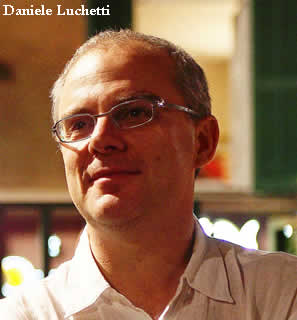 Cannes Film Festival. His feature films include It’s Happening Tomorrow, which was nominated in 1998 for Best Screenwriter and Best Young Film at the European Film Awards, in addition to La Settimana Della Sfinge, Arriva La Bufera, La Scuola, Little Teachers, and Ginger and Cinnamon. His documentary features include Ritratti D’autore: Seconda Serie and Another World in Possible, and he has even put himself in front of the camera acting in the film Il Cielo È Sempre Più. Luchetti currently resides in Italy and is also a highly regarded commercial director.
Cannes Film Festival. His feature films include It’s Happening Tomorrow, which was nominated in 1998 for Best Screenwriter and Best Young Film at the European Film Awards, in addition to La Settimana Della Sfinge, Arriva La Bufera, La Scuola, Little Teachers, and Ginger and Cinnamon. His documentary features include Ritratti D’autore: Seconda Serie and Another World in Possible, and he has even put himself in front of the camera acting in the film Il Cielo È Sempre Più. Luchetti currently resides in Italy and is also a highly regarded commercial director.
Bijan Tehrani: My Brother Is An Only Child is not a political movie but it shows all aspects of life through politics. What was your motivation to make this film? Is it true that politics were not the main subject of the film?
Daniele Luchetti: Yes that is totally true. Actually I was still working on the screenplay and I was not really happy. I could not find a key turning point that was convincing. By coincidence I happened to read a collection of letters by Chekov and in one of the letters he talks to one of his pupils about how you cannot really create a work of literature which is at the same time good literature and political. For it to be good literature, you have to talk about human beings who are involved in politics, or are interested in politics. That really rang true to me and I decided that this was my key. I actually had to re-elaborate my film in this light. I had to describe people who used politics as a way to create an identity for themselves. Actually this was a great help for me in terms of finding what I think is the key for the film, which is that it is a real emotional story rather than a political story.
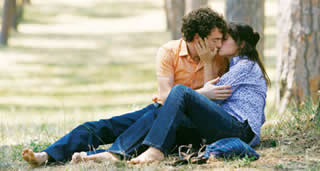 BT: One thing that I found very interesting is that both brothers, Accio and Manrico, are in search of a way to change the world and find their own identities. They both approach their quests in different ways. Much like their love for Francesca, they both love her but their approaches to love are different. Did you try to parallel these issues?
BT: One thing that I found very interesting is that both brothers, Accio and Manrico, are in search of a way to change the world and find their own identities. They both approach their quests in different ways. Much like their love for Francesca, they both love her but their approaches to love are different. Did you try to parallel these issues?
DL: Yes. In terms of their love for Francesca both of the boys were really charmed by her. The thing that charmed them was that she belonged to a different social class, she was a bourgeois. She was richer than they were. She was worldlier and was even half French. So I think they were really fascinated by her being so different. As you very rightly said both of them are in search of their own identity, and back in those years identity was closely connected to political choices. I remember in junior high school when you would meet a new friend, the first question that people asked was “what are you?” By “what are you?” they meant are you from the left or are you from the right. I guess it is still the same today but now people are divided over many other things such as consumer goods, and their approach to that, but yeah that is still the situation.
BT: When you compare My Brother is an Only Child to movies made during the 60’s and early 70’s by filmmakers such as Bertolucci, it has a more general and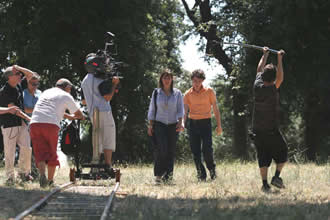 distant look at the political and social situation of those days. My Brother is an Only Child gives you a better idea of what was going on in the people’s lives. Again not necessarily about politics of the time, but what was going on emotionally in the society.
distant look at the political and social situation of those days. My Brother is an Only Child gives you a better idea of what was going on in the people’s lives. Again not necessarily about politics of the time, but what was going on emotionally in the society.
DL: In those years films were highly ideological. At the time filmmakers felt that they had to prove something, prove that they belonged to the right side. My approach was completely different. I want to actually tell a story and understand how things worked. For example when I was preparing myself for this movie I started watching documentaries and listening to recordings from those years. I realized that there is almost nothing that makes sense now. The people talked about different things. It was a different world. I decided that I wanted to describe deeper mechanisms. I did not want to describe any ideology. I wanted to describe how people felt. While filmmakers in those years were inside the ideological situation, I wanted to show things from outside.
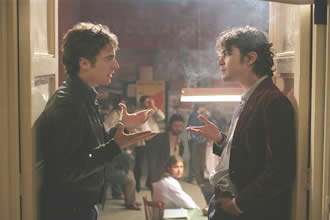 BT: The younger generations in Italy or in the U.S may find that the characters and situations in your film are foreign to them. It belongs to a world that does not exist anymore. Do you think they could find similarities and relate to issues addressed in this film?
BT: The younger generations in Italy or in the U.S may find that the characters and situations in your film are foreign to them. It belongs to a world that does not exist anymore. Do you think they could find similarities and relate to issues addressed in this film?
DL: Actually I have no idea if American audiences could relate to it. However, what I do believe is that this type of story is a fundamental component of what happened in Italy, and also a lot of other European countries, such as France and Germany. I believe that this is a way of telling our story honestly and straightforwardly. I believe that when somebody tells a tale and that is respectful and honest, I believe that people can feel part of it and relate to it at some level.
BT: The ending of the film for me brought some hope. Did you really want to have a happy ending to the film?
DL: Actually I wouldn’t say it was necessarily a happy ending. On the one hand, we have the brother’s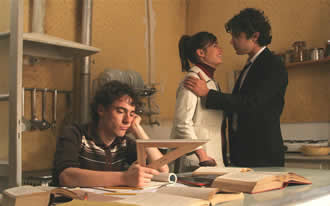 death, which is of course a very difficult moment. I would say that the positive thing is definitely that he seems to have identified a new way of being actively political. He found a specific way in which people’s real needs are dealt with. Then it is no longer ideology and then you see that maybe he will be able to find his own way, his own path in life. It kind of makes you understand that he has finally found something to hold on to, a path to follow. Maybe he has started to realize his mistakes, if you could call them mistakes. Regardless, he is still very fragile. For example, he is trying to take his brother’s place and this is a new mistake because it is not certain how he going to deal with it. He is definitely not his brother and this could lead to many other issues.
death, which is of course a very difficult moment. I would say that the positive thing is definitely that he seems to have identified a new way of being actively political. He found a specific way in which people’s real needs are dealt with. Then it is no longer ideology and then you see that maybe he will be able to find his own way, his own path in life. It kind of makes you understand that he has finally found something to hold on to, a path to follow. Maybe he has started to realize his mistakes, if you could call them mistakes. Regardless, he is still very fragile. For example, he is trying to take his brother’s place and this is a new mistake because it is not certain how he going to deal with it. He is definitely not his brother and this could lead to many other issues.
BT: My last question involves the acting in the film. When I looked through different sequences of the film, it almost seems like a documentary. Everything seems so real and so natural. Did you allow the actors to have some liberty in their work or was everything exactly like the scri pt?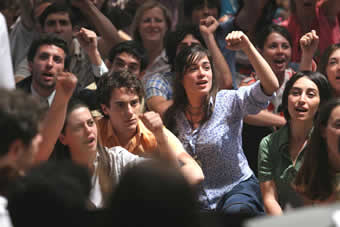 DL: I would say that I let the actors be totally free to do what they wanted to do. So actually what my main objective was for the film to ring true and to be fresh. As you said I wanted it to have some kind of documentary nature, and yes it was a result of a very complex operation. We had a rehearsal period where I told the actors that I wanted them to set aside any acting tricks that they knew. I actually had a bell that I would physically ring whenever they were using a trick. The first day the bell was ringing all the time, and by the third day they totally understood and I never had to ring the bell again. At that point I knew we were ready to shoot. So we went to the set and we didn’t have any more rehearsals. I let them do whatever they felt like doing. I even told my camera man to stay out. I never told him what I was going to do beforehand. So then when I would say action he would just come in and shoot everything without any preconceived ideas. Sometimes I had two or three cameras and all I asked of the actors was for them to show their emotion. I did not want them to be concerned with providing a big acting performance. I just wanted them to show their emotions. Sometimes I changed lines and directions because I wanted them to do whatever came up with total freedom. In the end I ended up with a lot of material for the editing stage.
DL: I would say that I let the actors be totally free to do what they wanted to do. So actually what my main objective was for the film to ring true and to be fresh. As you said I wanted it to have some kind of documentary nature, and yes it was a result of a very complex operation. We had a rehearsal period where I told the actors that I wanted them to set aside any acting tricks that they knew. I actually had a bell that I would physically ring whenever they were using a trick. The first day the bell was ringing all the time, and by the third day they totally understood and I never had to ring the bell again. At that point I knew we were ready to shoot. So we went to the set and we didn’t have any more rehearsals. I let them do whatever they felt like doing. I even told my camera man to stay out. I never told him what I was going to do beforehand. So then when I would say action he would just come in and shoot everything without any preconceived ideas. Sometimes I had two or three cameras and all I asked of the actors was for them to show their emotion. I did not want them to be concerned with providing a big acting performance. I just wanted them to show their emotions. Sometimes I changed lines and directions because I wanted them to do whatever came up with total freedom. In the end I ended up with a lot of material for the editing stage.
